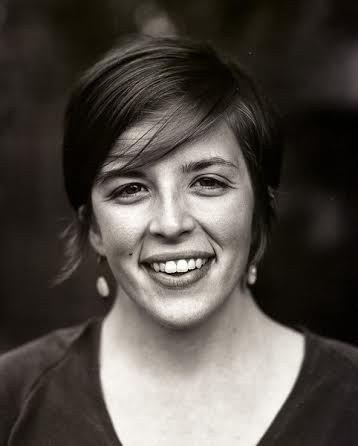Miel | Honey
for Thelma
Miel. Even the word begins slowly;
it lingers on two lips
with the taste of something sensual.
I practice, tongue to teeth. Miel, Miel.
Abuela stirs a spoonful of miel into a curved mug
and a smooth language flows from her tongue—
sticky words like dulce and suave,
words that fold themselves into the flame between us.
We sit at a wooden table, our knees shyly touching,
and she strings together scenes from other lives:
the sea that stole her son too soon,
the shoes she polished so bright they shone
white against the hot tar of Managua.
Arthritis has taken her hands,
twisted them tight, her wrists to knots
so fierce even the grip of a spoon
sends a gasp through her throat.
But tonight, she holds my face
in her two crooked hands
and sings, “Buenas noches, amor,”
sweet, slow as miel.
Armed Farmer
for Vicente
He’s an armed farmer: red earth pumping through him since the day it found him on the floor of a plantation barrack, birth blood surrounding him. The same day he bleated his first watery cry, his mother was buried deep in the earth. Before he knew how to grip a pencil, he danced a machete through five thousand straight rows of coffee, scrambling to stay ahead of the owner’s menacing pistol and Doberman. Before he knew the curve of a woman beside him, he crawled through the jungle with an AK-47 strapped to his back, fighting for Sandino, fighting for campesinos, fighting for the earth, fighting for his life. In the end, it won him five acres of his own land—his own land—more than a campesino could ever dream of, the legacy of three generations of field workers looming over him.
Sometimes, standing alone in his fields, he rubs the scar on his forearm where a bullet ripped through, clean, finding flesh over marrow. Bullets never choose sides; they only spit from the fingers of boys dead set on a cause that is miles away from where the real war is fought. Because what is a war anymore when a bullet is shot by a neighbor who lofts a different flag; when a bullet is bought by a Yankee cowboy in office who drags his spurs deep into this country, spills red and then walks away?
Years later, the farmer discovered that land never chooses sides either; it only returns as much as it’s loved. And this armed farmer loves deeply—he whispers prayers to new plants as he folds their roots into the ground; he’d rather see weeds creep into crops than to poison them with chemicals. He traded in his gun to build a zinc roof over his family—he still smiles when the sweet sound of winter rain falls above him like the rat-tat-tat of an AK-47 across a mountain valley. These days, this armed farmer traipses down freshly cut paths on two sturdy legs, armed with a machete in one hand and a fistful of plants in the other, black soil still clinging to roots.
Villa Esperanza
This morning, perched in my usual spot on the patio—book in hand, the familiar low babble of Spanish from the neighbor’s television—I spot an old woman squatting on the curb. I guess her to be somewhere between sixty and eighty, no way to tell in a country well-weathered from twenty years of war. She is worn—mouth collapsed to gums, a nest of hair atop bark-like skin. She found the only shade for blocks, a rare breeze beneath an avocado tree. But even in this wet heat, she wears a green sack-cloth smock and a baggy overcoat.
A fallen avocado catches her eye. It is wrinkled and blackened by the sun. She conjures up a wad of thick spit and rubs it around with her fist, grinning her gums at this new business venture. “Aguacate!” she calls to a boy passing on a bike with no seat. His face is young, eyes still soft, but the muscles in his bare back are taut like a man’s. The old woman holds the fruit in one hand and lifts the other, open-palmed, expectant. The boy doesn’t even break his rhythm to glance her way. She doesn’t seem to notice either, already tossing the dark fruit to a stern-looking black bird who has joined her on the curb. Then she catches my eye, flashes a pink grin, and nods my way. “Buenos dias,” she sings. I leave her still smiling, muttering old sayings to the birds on this shaded curb in Nicaragua.
First published in 2013 by Pinchpenny Press, Goshen College, in Getting There by Mary Roth. Used by permission.
